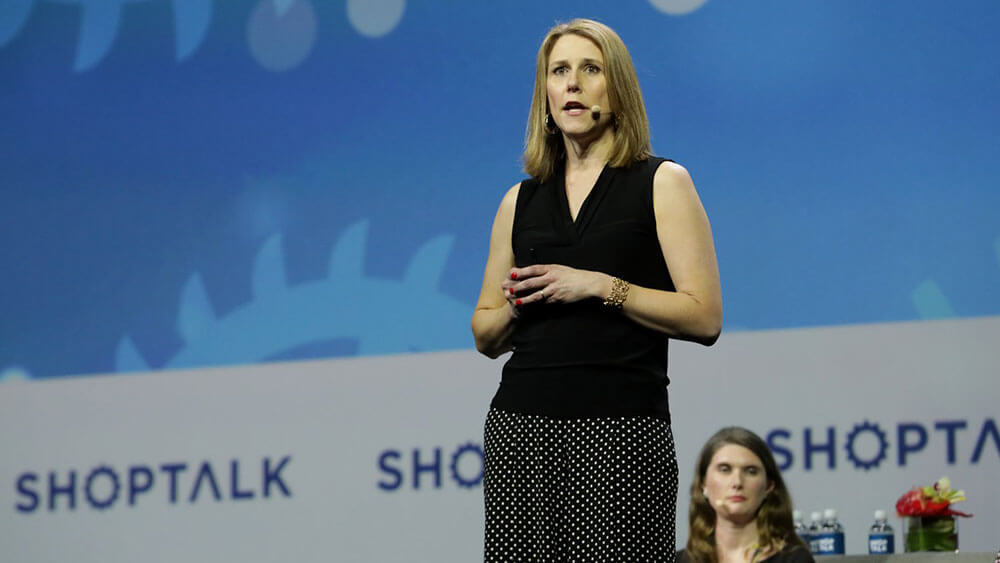
Zia Daniell Wigder, Shoptalk’s chief global content officer, speaks during the 2019 conference. Shoptalk made headlines when it announced its 2020 conference would feature an all-women lineup of speakers. (Courtesy Shoptalk)
Shoptalk, the retail conference, made news this month when it announced that its next conference, to be held in Las Vegas in March 2020, would feature an all-women speaker lineup, including both track sessions and main stage keynotes.
The conference is taking the groundbreaking step — “a first in events in our knowledge,” as Zia Daniell Wigder, Shoptalk’s chief global content officer characterized it. The all-female speaker program is an effort to “propel our industry forward and showcase the many incredibly talented women who are working to transform retail in every way,” Wigder wrote in statement posted on the conference website.
In the conference’s first five years, “We’ve seen women founding companies, driving startups forward and rising through the ranks at brands, retailers and technology companies,” she wrote. “Yet there are still far too few women at the most senior levels in our industry. This problem is by no means unique to retail — there are now more college-educated women than men in the workforce, yet the percentage of S&P 500 companies led by women still remains just 5 percent, a percentage that is simply unacceptable and untenable.” Is the all-female speaker decision extreme? Wigder asked. “Absolutely, but we think extreme problems require extreme solutions.”
The decision was applauded widely as a bold move, but not uniformly seen as a good idea. “It’s a sad commentary that this strategy is seen to be necessary,” Gina Glantz, co-founder of the non-profit GenderAvenger, which advocates for the inclusion of female and other points of view in the public discourse, wrote in an email to Convene. “I compliment the thought behind the upcoming conference. However, the strongest message is sent when women are seen as equals and are equally present on stage,” Glantz added. “So, I admit I would prefer their 50/50 policy be implemented in 2020. “
Some also dared to ask: If excluding women and other groups from speaking roles at conferences is wrong, why is it then okay to exclude men? It’s a fair question. There are two things, in my view, that set the Shoptalk decision apart:
- It’s temporary and designed to make a point. Starting in 2021, Shoptalk will feature 50/50 male and female speakers every year, according to Wigder. “Reaching gender parity in 2020 would have been relatively easy, but it would not have shifted the dialogue in the way that Shoptalk has done consistently.” Shoptalk’s organizers are making a big bet that its audience will show up for an event where speakers are exclusively women, and if successful will have impact outside of the retail industry.
- Male speakers are participating in creating the speaker lineup. Shoptalk had already confirmed male speakers for its 2020 event — those speakers were asked to nominate a woman from their organizations to take their place as a speaker. “That way our audience will still hear from the most prominent brands in the industry that are already set to speak,” Wigder wrote. It’s a smart way to involve male speakers in supporting women speakers.
For event organizers, there are some additional lessons: Shoptalk apparently made the decision to switch to an all-woman speaker lineup when the planning for the 2020 speakers was well underway, with more than 60 speakers already procured. Surely it would have been a little easier for everyone to take that bold idea and put it on the shelf for a year. But Shoptalk organizers’ willingness to act quickly demonstrates a mentality described in a column, “5 Ways to Think Like a Start-Up,” in the November issue of Convene, by 360 Live Media’s Don Neal. Neal mentions Shoptalk by name as being among a group of events that are succeeding in attracting audiences by breaking out of old formulas, thinking in new ways, and daring to make big, not incremental, changes.
The move also demonstrates the power that conferences hold to drive change, if they dare. Progress may be glacial when it comes to putting women in Congress or at the highest levels of corporate and organizational hierarchies. But creating an event where all of the speakers are women? That, as Shoptalk is showing us, is doable.
Barbara Palmer is deputy editor of Convene.
